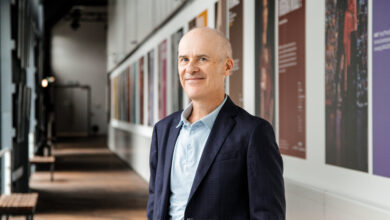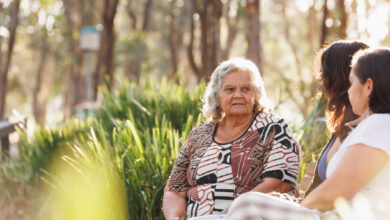Multigenerational house sharing has ‘changed people’s lives’

While searching for a place to live near the city, 41-year-old student Ruth* said that something clicked when she first met her 83-year-old housemate, Lucy*.
The pair have lived together in Lucy's apartment in Sydney’s beachside suburb of Coogee for almost three years, and both come from entirely different walks of life.
“We just got along together right from the beginning,” said Ruth, who moved to Australia from Papua New Guinea 11 years ago.
“I come from a culture where we live with the old and the young together, so it's normal for us back home to have grandma, granddad, or the great-aunt or great-uncle, living with us in the same home.”
Ruth met Lucy through an intergenerational housing scheme which matches older homeowners with younger people seeking affordable rent while they work or study.
Holdsworth, a non-government community organisation, has run the program since 2018.
Each day Ruth will leave to attend her classes, and carers will come over twice a week to assist Lucy, who has partial dementia.
The pair will spend their evenings eating dinner together and will take long walks around the area to admire the local seaside mansions.
“We love driving and admiring homes. There's a lot of nice houses on the east coast, so we do that quite often,” said Ruth.
“We also love to go and walk along the coast.”
Intergenerational housing projects have gained considerable traction over recent years. Emerging in the US during the 1970s, the phenomenon has appeared across Europe, Canada, the UK and Australia.
Studies have shown that the benefits of mixed-age housing are significant, with participants experiencing decreased loneliness, an improved sense of safety, and a stronger connection to their community.
Lucy’s daughter, Megan*, said that since living with her mother, Ruth has become a part of the family.
“She has provided us with incredible peace of mind”, she told Aged Care Insite.
“They have both developed a wonderful friendship that has been lovely to watch unfold.”
Most recently, the NSW government granted the Holdsworth program additional funding to address homelessness and growing rates of social isolation.
The funding will allow people aged 18-24 to access the program without fees for one year.
With skyrocketing property prices in Australia, people are struggling with the lack of housing affordability. It is expected that home-ownership rates will fall to around 63 per cent by 2040.
Increased social isolation exacerbated by COVID-19 has also left people who live alone more vulnerable than before.
Wendy Francis, Holdsworth’s manager for services for older people, said the program has seen more interest from women over 50; the fastest-growing group at risk of homelessness in Australia.
“It's not women who are already homeless, but women who are recognising that they're needing to secure more affordable accommodations,” she said.
“They may have had a change in their employment or their marital situation, so they're looking for something where they can just shore themselves up for a period.”
The pilot program has received high levels of community interest, with hundreds of inquiries being made each year.
Wendy said she has witnessed many successful partnerships as a result of the homeshare.
“Some amazing connections and relationships have genuinely emerged from this very bespoke matching service, and those relationships, its changed people's lives,” she said.
“It’s also been a wonderful opportunity for empty nesters or people who are recently retired and want to make a difference and contribute to their communities, to give a younger person a bit of a start in life.”
Older participants have also reported feeling more secure and comfortable in being able to stay at home longer, said Wendy.
“It's really clear that our age care system needs innovative alternatives so that people can truly have a choice about where they live,” she said.
“For most people, it's very clear they don't want to go to a nursing home, and so I think that it’s really exciting that we are offering a legitimate alternative and choice for them.”
*Some names in this story have been changed at the request of the interviewees.
Email: [email protected]





